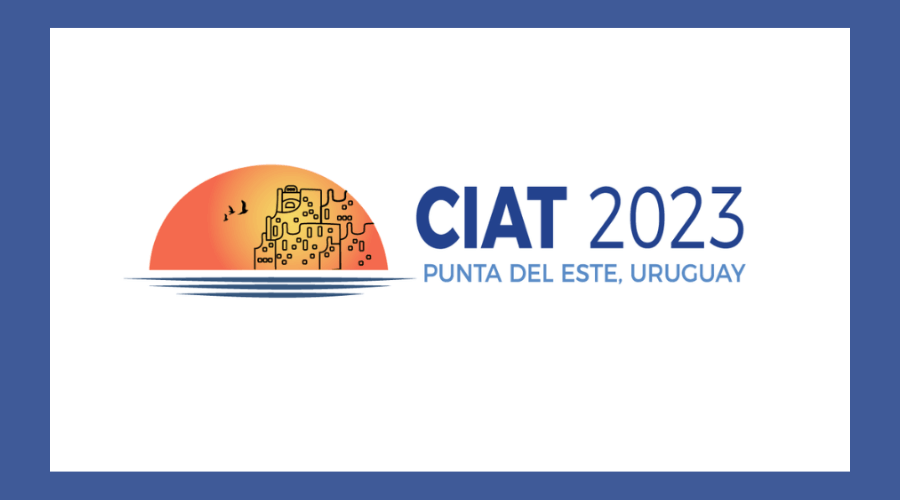The 57th CIAT General Assembly: the importance of tax administrations for the development of countries

Last week, from May 23 to 26, 2023, The 57th CIAT General Assembly was held in Punta del Este (Uruguay), hosted by the Uruguayan General Directorate of Taxation, with the theme “The Tax Administration as a protagonist of the country’s development strategy”.
The Spanish Delegation was headed by the Secretary of State for Finance, Jesús Gascón and the General Director of the Tax Agency, Soledad Fernández Doctor. In addition, as is already a tradition, the Spanish Institute for Fiscal Studies participated among the institutions invited by CIAT.
Founded in 1967 by representatives of nineteen American countries, CIAT is an international organization that currently includes forty-two member countries from four continents: thirty-two American countries; five European countries; four African countries; and one Asian country. Spain joined in 1990, when the Statutes of CIAT were adjusted to allow the association of States other than those of America.
Within this framework, the debates and exchanges of ideas make it possible to learn about the experiences of the countries’ tax administrations and to reflect on the challenges and successes of the measures adopted. This is of enormous value to all participants, and it contributes to the improvement in the application of tax systems.
This year, the presentations of the 57th Assembly revolved around three axes: digitalization; synergies with companies, citizens and other economic agents, both public and private; and finally, the contribution of tax administrations to social inclusion and the reduction of informality.
Firstly, digital transformation is a challenge faced by all tax administrations around the world. It serves to improve the quality of the services provided to the taxpayers, facilitating compliance with tax obligations and reducing costs for the private economic agents. A widespread observation was that the pandemic forced a particularly important leap forward in the digitalization of taxpayer services.
Secondly, modernization of administrations radiates towards companies, stimulating them to adopt new management methods. The star topic of this point was the analysis of different experiences and progress in electronic invoicing. Naturally, the implementation of electronic invoicing imposes additional compliance costs for companies, at least initially, but it also helps them to improve tax compliance, so the necessary investment is soon amortized.
In addition, thirdly, many of the interventions showed that tax administrations are assuming a new role, intensified by the pandemic: that of granting aid to companies and families. This is due to the fact that, in most countries, tax administrators have been the ones with the best information and the greatest capacity to assist companies and families in a short period of time. It is perhaps too early to tell, but listening to several of the speakers, one can point to a structural lasting change in the goals that governments attribute to their tax administrations.
As far as informality is concerned, first of all, it is necessary to recognize that formal and informal economies are not watertight compartments, it is possible to move from one to the other due to slight changes in circumstances or rules, and that in many cases informality constitutes an involuntary circumstance. And a second element to consider is that informality is not only a tax phenomenon, but it also affects labor, health and other aspects of economic and social activities. However, when an instrument such as personalized VAT is used, in addition to contributing to social inclusion, it is intended to stimulate small businesses to adhere to formal taxation systems and therefore to reduce informality.
Thus, among the many tasks that tax administrations can face, useful measures to contribute to the gradual reduction of the informal sector may be to simplify and reduce the costs of formality through special regimes for SMEs; to provide taxpayer services focused on those who are on the limit of formalization; or to become aware of the digital divide when digitalization is promoted. Finally, it is important to recall a fact that was mentioned in the sessions: in two out of three low-income countries, women tend to be more present in the informal sector than men.
The Secretary of State for Finance of Spain, Jesús Gascón, gave the closing conference to highlight the main issues that had been addressed over two and a half days of intense work. Based on the already long experience of international technical cooperation between the CIAT member countries, he found a certain convergence between the countries of America and the OECD as a whole. He encouraged everyone present to continue working to preserve the treasure that represents the network of personal and institutional relationships that fifty-seven years of common work represent for the future of tax administrations.
We look forward to the next meeting, in this case the annual technical conference, to be held in Ecuador in autumn 2023.
This article was reproduced with the authorization of the authors (Alain Cuenca – Ignacio Corral – Cristina García-Herrera), originally published in Blog Fiscal de Crónica Tributaria.
2,839 total views, 8 views today
